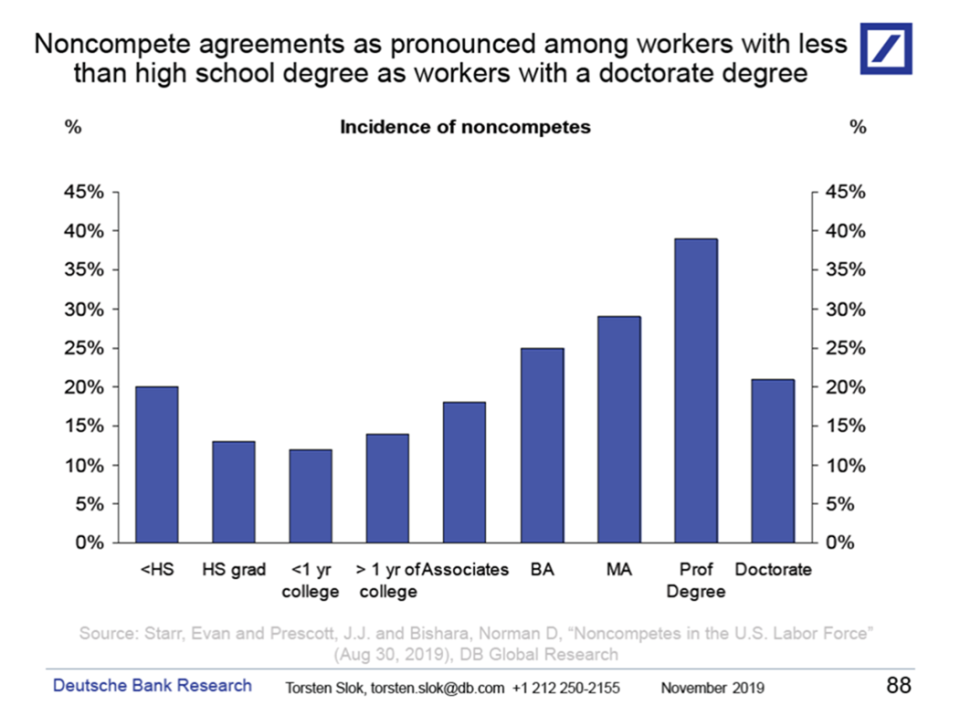Why non-compete agreements suppress wages for everyone
Independent research shows almost 40% of all American workers are subject to non-compete clauses which prohibit them from getting better paying jobs. The federal government puts the figure at about 20%. This could explain why wages have been slow to increase for several years according to Deutsche Bank Securities Chief Economist Torsten Slok.
“That’s telling you that if companies become more and more powerful, then maybe that could be the reason why something like this happens,” Slok told Yahoo Finance’s On the Move.
Deutsche Bank research shows non-compete agreements are more common among younger Americans than older workers. Roughly 25% of workers 35 to 40 years old are likely to have signed a non-compete followed by roughly 22% of people aged 22 to 30. It’s around 15% for workers 49 to 54, 22% for workers 54 to 59 and 15% for workers older than 59.
“The fact that this is so pronounced, including in particular for people that are millennials and the young generation, this is somewhat striking data,” according to Slok who thinks people just out of college sign non-competes eager to land any job they can get.
The data shown in the chart below indicates people without college degrees and with lower paying jobs are as likely to work under a non-compete agreement as those with a doctorate degree.
“There’s also emerging academic literature about this,” says Slok that could show how non-competes could be suppressing wages for all Americans. “The short answer is we are on this, because we think this has become, perhaps, a very important reason why wage inflation has been so muted for the last 10 years.”

Slow response from the federal government
The Federal Trade Commission recently held a workshop on ways to protect workers from non-compete clauses.
“Workers suffer when competition for their labor is chilled and employers are insulated from competition,” FTC Commissioner Rebecca Kelly Slaughter said. “Job opportunities become more limited, and workers are less able to negotiate better pay, benefits, or working conditions.”
Slaughter says some employees get trapped in lower paying jobs instead of moving up. She points to the case of sandwich makers at Jimmy John’s sandwich shops who were prevented for a period of two years from working at competing businesses that earn 10% of their revenue from selling sandwiches. The state of Illinois successfully sued Jimmy John’s which dropped its non-compete policy.
But Slaughter cites data that shows 16% to 18% of all U.S. workers are currently covered by a non-compete provision, meaning that they have restrictions on where they can work even after they leave, lose, or are let go from their current job. “This includes 12% of workers who earn less than $20,000 per year and 15% of those who make $20,000 to $40,000 per year,” she said in testimony before the FTC.
Congressional lawmakers including Elizabeth Warren (D-Mass.), Chris Murphy (D-Conn.), and Ron Wyden (D-Ore.) introduced the Workforce Mobility Act in 2018 to prohibit non-competes. The legislation died in committee.
But Slaughter says individual states have passed legislation to protect low wage workers and it helps raise wages. She says, “A study of an Oregon ban on non-competes for low-wage workers found that relative to control states, the non-compete ban increased average hourly workers’ wages by 2–3%, rising to 6% five years after the ban was implemented.”
Last year U.S. Senators Chris Murphy, a Democrat from Connecticut and Republican Todd Young of Indiana tried again to take federal action. They co-sponsored and introduced a new version of the failed Workforce Mobility Act saying, “Non-compete agreements are economic and innovation killers. Too many employers hide these agreements in low-wage workers’ contracts, trapping them in low-paying jobs and preventing real competition.”
Slok says a political solution may work but is no guarantee since it may interfere with the job market. “So this is why a very important part of the debate is should that be done?”
Slaughter says, the new proposed federal legislation is a positive development, “but we need not wait for legislation to tackle this issue head-on.” She says FTC antitrust enforcement and competition policy could be used to protect American workers from non-compete agreements that keep their wages down.
Adam Shapiro is co-anchor of Yahoo Finance’s “On the Move.”
Rare ‘48 Tucker is just one of the million-dollar-plus cars up for auction this weekend
Former Trump official: 'Markets would prefer a Joe Biden' over other Democrats
As shares fall below $1, it 'might be too late' for JC Penney to turn around
Delta CEO to Boeing: 'Don't lose sight of the future' following 737 Max problems
Why this investor believes Tesla will become a trillion dollar company
Read the latest financial and business news from Yahoo Finance
Follow Yahoo Finance on Twitter, Facebook, Instagram, Flipboard, LinkedIn, YouTube, and reddit

